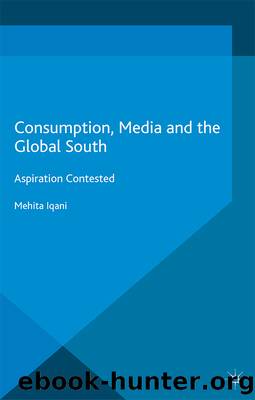Consumption, Media and the Global South by Mehita Iqani

Author:Mehita Iqani
Language: eng
Format: epub
Publisher: Palgrave macmillan
Mediating the yuppie: Neoliberal culture and southern upward mobility
Taking the theme of upward mobility and the emergence of new classes of wealth, this chapter has examined some of the cultural dimensions to so-called “yuppie” subjectivity in the global south. The powerful narrative of the dream and its intergenerational dimensions; the potent symbolism of the luxury car; and the uncomfortable ambiguities and slippages of claims about the middle class as the forerunners of broad-based equality are just three aspects of the mediation of southern “yuppies”. They are important because they show how subjectivities at the interface of the poor and the rich are a symbolic testing ground for neoliberal values in global south contexts. Various forms of capital are collected and deployed by middle-class subjects. Paying attention to mediated narratives about their social position and consumer practices allows us to better understand the cultural dimensions of what the middle class means in the global south – in addition to the extensive debates about the economic and political dimensions already explored in detail by existing studies on the topic. New upper-middle-class agencies in each context are portrayed as rich in all forms of capital, and strategic in the ways in which they earn and expend their resources.
Although it is impossible to conflate yuppie lifestyles in China and South Africa (and the analysis presented here has been at pains to avoid giving such an impression), there are some compelling discursive intersections in the narratives of individual success, agency and lifestyle presented in the six documentaries in question. How useful is the framing of the “yuppie” for considering the representation of social mobility in China and South Africa, and the global south in general? The concept itself is a Western import, and it has been reimported in the ways in which the films present Western gazes on global south subjectivities. The characters represented in the films discussed here are only yuppies insofar as the filmmakers (explicitly or implicitly) labelled them as such. The idea of upward mobility is also central to the middle-class experiences mediated in the films: this is poignantly captured in the metaphor of the dream, spectacularly illustrated in the aesthetics of the automobile, and morally wrestled with in claims about a trickle-down effect. “Yuppies” represent the mixing of an explicit orientation to material culture and an ideological commitment to individualistic achievement framed as capable of collectively constituting national development. The identities and subjectivities presented in the documentaries do square with the notion of the “yuppie” in terms of the emphases placed on idealism and reaching for a better future out of a worse past, in terms of the attention paid to owning the best types of commodity (especially cars) possible, and in terms of the moral attachment to commercial practices as socially transformational and important.
But in some respects the use of the term “yuppie” is an uncomfortable fit for global south contexts. In the first instance is the marked cultural imperialism and anachronism of the term. Does its deployment in the
Download
This site does not store any files on its server. We only index and link to content provided by other sites. Please contact the content providers to delete copyright contents if any and email us, we'll remove relevant links or contents immediately.
Call Me by Your Name by André Aciman(18964)
Ready Player One by Cline Ernest(12837)
How to Be a Bawse: A Guide to Conquering Life by Lilly Singh(6693)
Wiseguy by Nicholas Pileggi(4586)
The Kite Runner by Khaled Hosseini(4432)
On Writing A Memoir of the Craft by Stephen King(4213)
The Crown by Robert Lacey(4105)
Audition by Ryu Murakami(4098)
Call me by your name by Andre Aciman(4072)
Harry Potter and the Cursed Child: The Journey by Harry Potter Theatrical Productions(3962)
Gerald's Game by Stephen King(3918)
The Perils of Being Moderately Famous by Soha Ali Khan(3782)
Dialogue by Robert McKee(3582)
Dynamic Alignment Through Imagery by Eric Franklin(3488)
Apollo 8 by Jeffrey Kluger(3199)
How to be Champion: My Autobiography by Sarah Millican(3186)
Seriously... I'm Kidding by Ellen DeGeneres(3100)
Darker by E L James(3088)
History of Dance, 2E by Gayle Kassing(3000)
